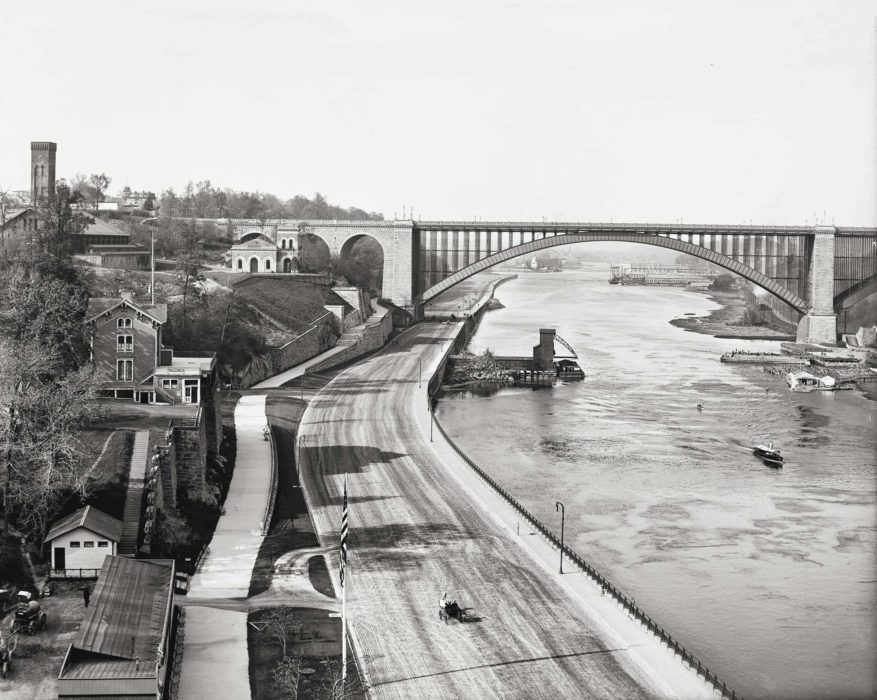AS ‘ABDU’L-BAHÁ APPROACHED Mount Morris Baptist Church at Fifth Avenue and 126th Street in Harlem at 7 p.m. on Sunday, May 26, 1912, he noticed the chorus of a popular Protestant hymn eddying out into the street.
Nearer, my God, to Thee, nearer to Thee!
E’en though it be a cross that raiseth me;
Still all my song shall be nearer, my God, to Thee..
This was the hymn the orchestra had played around midnight on the deck of RMS Titanic as she went down. Bands across the United States had played it at 3:30 p.m. on September 14, 1901, to commemorate President McKinley’s assassination. The Confederate band had played it beneath the late afternoon sun on July 3, 1863, as the few survivors of Pickett’s Charge at Gettysburg struggled back to camp.
Though like the wanderer, the sun gone down,
Darkness be over me, my rest a stone;
Yet in my dreams I’d be nearer, my God, to Thee.
This evening in Harlem, ‘Abdu’l-Bahá was about to talk about the meaning of sacrifice.
He had arrived from Boston by train just an hour earlier and he was utterly exhausted. He rested in the chancel as Reverend J. Herman Randall led the service. Juliet Thompson recalls catching a glimpse of him “sitting — almost lying — in a big curved chair.” Yet something about her description belies his fatigue: “The sleeves of His bronze-colored ‘abá branched out from His shoulders like great spread wings, hiding His hands, so that I was conscious only of His head and those terribly alive eyes.”
Reverend Randall extended a hand to ‘Abdu’l-Bahá and welcomed him to the pulpit.

“The greatest attainment in the world of humanity is nearness to God,” ‘Abdu’l-Bahá told the congregation. “Every lasting glory, honor, grace and beauty which comes to man comes through nearness to God.”
“But nearness to God is not an easy accomplishment,” he said. ‘Abdu’l-Bahá evoked the early history of Christianity to illustrate his point: “During the time Jesus Christ was upon the earth mankind sought nearness to God, but in that day no one attained it save a very few — His disciples. Those blessed souls were confirmed with divine nearness through the love of God.” This nearness, he said, “is contingent upon self-sacrifice,” which “is made possible through the baptism of water and fire revealed in the Gospels.”
At the beginning of Jesus’s mission, he had walked down to the River Jordan and instructed John the Baptist to perform on him the ceremony that John had been carrying out for others: immersing them in water as a symbolic act of cleanliness that separated them from the mire of sin. When Jesus stepped out of the water the heavens opened, and he saw the Holy Spirit descending upon him as a dove.
The Baptist audience ‘Abdu’l-Bahá addressed that evening based their faith on Believer’s Baptism, performed at an age when a soul could consciously exercise his or her own free will.
Following Christian tradition, ‘Abdu’l-Bahá explained the meaning of the symbols of water and fire: “Water symbolizes the water of life, which is knowledge, and fire is the fire of the love of God.” “Therefore” he said, “man must be baptized with the water of life, the Holy Spirit and the fire of the love of the Kingdom. Until he attains these three degrees, nearness to God is not possible.”.
‘Abdu’l-Bahá turned to a second example of sacrifice — that of the followers of Bahá’u’lláh in Persia. “They gave their lives for this station, sacrificed honor, comfort and possessions,” he explained. Twenty thousand of them, like the early Christians, had paid the ultimate price. “[They] hastened with the utmost joy to the place of martyrdom; their blood was spilled, their bodies were tortured and destroyed, their homes pillaged, their children carried into captivity. They endured all these conditions joyfully and willingly.” “Through such sacrifice,” ‘Abdu’l-Bahá concluded, “nearness to God is made possible.”
‘Abdu’l-Bahá then described by metaphor the outcome of such pain and suffering. “Behold how the sun shines upon all creation,” he said, “but only surfaces that are pure and polished can reflect its glory and light.” It takes great sacrifice to reflect God’s attributes. “The more pure and sanctified the heart of man becomes, the nearer it draws to God, and the light of the Sun of Reality is revealed within it.”
As the evening drew on, ‘Abdu’l-Bahá leaned ever more heavily on the pulpit to support himself. He related Jesus’s Parable of the Sower, talked of the need for each soul to “strive for capacity and seek readiness,” and then he brought his address to a close.






